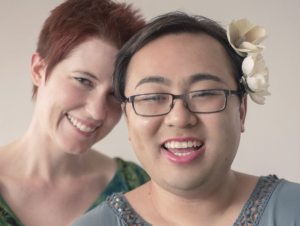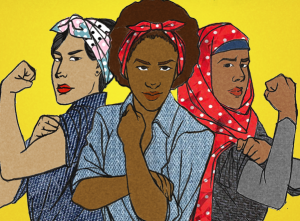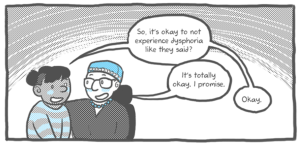
CC
No matter how we find our way to feminism – whether it be an ah-ha moment of realization or a gradual process – the work of being a feminist doesn’t stop there.
“Coming out” as a feminist and openly incorporating its values into everyday life can be challenging in an anti-feminist world. Feminists oftentimes struggle silently as they work to reconcile their feminist identity with the many patriarchal ideas or values they have internalized as members of this society.
Just because one adopts a feminist identity doesn’t mean the years of being taught what beauty looks like, the confines and privileges of gender, or racist stereotypes will suddenly vanish from one’s mind or way of knowing and experiencing the world.
It’s difficult to be honest with yourself about the extent to which you may unknowingly or unintentionally partake in systems of patriarchy and kyriarchy (intersectional systems of domination).
But being honest with yourself about the fact that you’ve internalized these messages and values is what honest and accountable feminism looks like.
It’s important that we challenge ourselves and each other to become the best feminists we can be. It’s not a competition or a means for creating hierarchy within the movement of “bad feminists” and “good feminists,” but rather an opportunity for contributing to and living by an inclusive, accountable and progressive feminism.
Thus far on my journey of becoming a better feminist, confronting and “unlearning” or learning how to better navigate internalized beauty ideals has been one of my greatest challenges.
For example, I wear makeup almost every day. Does that make me a bad feminist? No, but because I’ve realized that I don’t wear makeup as an act of self-love or empowerment, I do consider it a marker of the fact that I’m still struggling to overcome beauty ideals that I began internalizing from a young age.
From my experience, it’s important to not become frustrated with your progress in “unlearning” patriarchal values. It’s hard work, but it’s important and necessary work. I know that one day I will be able to ditch my makeup and in the meantime, I’m working to internalize a healthier, more accepting and loving concept of beauty and “unlearn” harmful self-judgment.
The result of years of internalized privilege, sexism, racism, heterosexism, classism, transphobia, or ableism will rear its ugly head differently for every feminist.
But an easy and proactive thing that you can do throughout your typical day is to actively question your assumptions.
How To Question Your Learned Assumptions
We all make snap judgments about the people and situations we encounter. Sometimes it will seem almost involuntary, but these snap judgments are oftentimes rooted in the regressive and divisive messages that feminists are working to disrupt.
So, the next time you catch yourself making an assumption about someone’s values, likeability, or identity based on their ethnicity, race, gender, style of dress, or speech:
- Actively ask yourself why you jumped to that conclusion about a complete stranger.
- Make sure to question the assumptions and judgments that you make about yourself. More often than not, they will be at least partially informed by discriminatory systems of thought.
Getting in the habit of questioning your assumptions is a helpful way to “train” yourself to stop making harmful judgments and uncover some areas of thought or feminist practice where you have room to grow.
Questioning your assumptions should go hand-in-hand with recognizing your privilege.
How to Responsibly Recognize Your Privilege
You may benefit from white privilege, heterosexual privilege, cisgender privilege, thin privilege, class privilege, male privilege, or the many other types of privilege that exist.
Recognizing the forms of privilege that you benefit from and the degree to which you experience certain types of privilege should not become a crippling source of guilt. But rather it is a call to action and awareness about the unequal distribution of socioeconomic power and mobility.
Answering this call to action can take several different forms, but can be based on the following principles.
- Make sure the spaces you occupy — whether it be your workplace or the feminist blogosphere — are inclusive of traditionally marginalized communities, voices, issues, cultures, etc.
- Come from a sincere and honest place of “checking your privilege” when having an inclusive approach and working to ensure that you don’t actively participate in or support the perpetuation of systems of privilege.
- Listen to and learn from other feminists and feminisms. The diversity within the feminist community is far-reaching and working across difference in a non-tokenizing way is a great way to broaden your understanding of feminism, make the feminist movement once of inclusivity, and create a feminist support system in the meantime.
The journey of becoming a better feminist will not happen overnight. And it will be difficult to reconcile the fact that while our feminist values are oftentimes at the front and center of our conscience, it’s hard to shake the patriarchal ideas and messages that we have internalized about ourselves, others, and the society in which we live.
But the only way that we can create a more inclusive, accountable and progressive feminist movement is if we first strive for these values on an individual, personal level.
In the New Year and beyond, I hope you’ll inspire a revolution from within to become a better feminist and contribute to an ever-evolving progressive feminist agenda.
[do_widget id=”text-101″]
Sara Alcid is a young feminist living and working in Washington, DC as a reproductive health and justice advocate. Sara loves thinking, reading and writing about the socially and personally transformative power of feminism, queer issues, and women’s health. Follow her on Twitter @SaraAlcid.
Search our 3000+ articles!
Read our articles about:
Our online racial justice training
Used by hundreds of universities, non-profits, and businesses.
Click to learn more




















